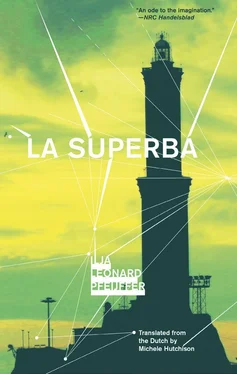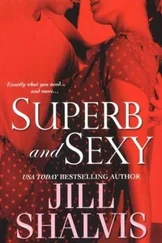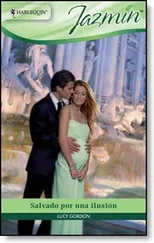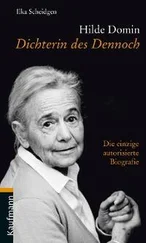“In my second to last year, we got this math teacher from India. A brilliant man, I’ve no doubt about that. But he had a terrible stutter. And I wrote a limerick about it in my exercise book. But he saw it and confiscated my book. He read the limerick. And then there was trouble.
“The next morning I had to go to the headmaster’s office. Along with my father. The headmaster had my exercise book lying on his desk. He put on a stern face, opened the book, and read out the limerick. I sniggered. ‘There’s nothing funny about it, Perrygrove Sinclair. Did you write this?’ My father sat motionlessly in his chair, resting his weight on his walking stick. He’d adopted a stern expression, too. ‘Although it might not be perfect in terms of meter,’ I said, ‘I’m not ashamed to admit that I’m the proud author of this poem.’ The headmaster slammed his hand on the desk. ‘There’s isn’t a single reason to be proud of this filth.’ Then my father stood up. ‘I agree with you completely, headmaster. My son has sullied the good name of the many generations of Perrygrove Sinclairs who have been educated here.’ He decided to take me out of school and sent me into the army.”
Don took a sip of his gin and tonic and asked the passing waitress for some extra ice and a lacrima .
“And now, of course, you’ll ask whether I can still remember the limerick.
A math teacher from Calcutta,
was stuck with an incredible stutter.
But his girl smiled with glee,
for she found out that he
took more time than others to fu…fu…fu…
“Only the last line still rhymed, you know. But you got that already. When I read it out to my mother that evening, she laughed. She kissed my forehead. The next morning I took the bus to the barracks.
“A year later I was in Malaysia. For the so-called Emergency. You weren’t allowed to call it a war, but it was one. It began in 1948 and didn’t end until 1960 or 1961. I was in the parachute regiment. One day a grenade exploded a little too close by. All my guts were blown open. I’ll show you the scars. Look. See that? I almost died. Because of a limerick. I almost died because of a fucking poem.”
5.
Quite frequently he’d emerge from his hotel in the afternoon with visible wounds from the night before. Scabs on his head or elbows or bloodstains on his shirt. When I asked him once what had happened, he spread his arms and replied triumphantly, “I can’t remember anymore.” And when I carried on asking, he said, “Normal people fall down the stairs, I fall up the stairs.” And when I carried on asking some more, he said, “There’s a security camera next to the entrance to my hotel. I’d love to see a compilation of all my spectacular homecomings.”
Slowly something else began to dawn on me, something he kept carefully hidden behind his suits and ties, his impeccable appearance — a few bloodstains notwithstanding — his Oxbridge accent, his lacrima gin, and his residency in a hotel room from whose window he’d hung a Union Jack. He was totally broke.
It became clear to me one evening when he asked me to come up to his hotel room to fix his television. Repairing it wasn’t the problem. That was a simple matter of putting the plug in the socket. But the socket! A kind of pre-war construction made of several cracked Bakelite components. There were bare wires. “Is this yours?” I asked. “No, it’s the hotel’s.” And then I took a closer look. There were patches of damp everywhere. The wallpaper was peeling from the walls. His bed was a yellowed mattress on top of an old door. I went to the bathroom, but I’d have been better off not going. There were empty gin bottles and the remains of kebabs all over the place.
“How much do you pay for this room, Don?”
“I’ve been here so long. The owner’s an old friend of mine. I’ve known him since—”
“How much do you pay for this room, Don?”
“Two hundred.”
“And how often do they clean it?”
“Sometimes.”
“How often?”
“The problem is I have to clean it myself before the cleaner dares come in.”
We carried on our conversation out on the square. He took a sip of gin and tonic.
“Just before my father died,” he said, “he summoned me to his study. It was the first time we’d spoken to each other since he took me out of school. Well, to say ‘we spoke to each other’ is an exaggeration. He gave me a file. It contained all the paperwork for his pension, his life insurance, my mother’s, and my pension, all perfectly documented and ordered and all of them with one of the most traditional and reliable banks in England.”
A waitress went past so he ordered ice and a lacrima .
“Barings Bank.”
He paused for a moment.
“I don’t know if it made the news in your country at the time. In England it was a drama. Ten thousand respectable, honest, hardworking people lost all their savings in one fell blow.”
His eyes filled with tears.
“Nick Leeson. I’ll never forget his name. It was 1995. He was a trader for Barings Bank in Hong Kong. He had gambled away millions of their capital on the stock market and then billions more in an attempt to make good on his loss, then he fled to Thailand in his Ferrari. They got him in the end, tried him, and sent him to prison. He did his time. Then he wrote a book that became a bestseller and made him a multi-millionaire again. But Barings Bank was bankrupt. And do you know what it means when a bank goes bankrupt? I know you know what it means.
“If I add it all up, what with my time in the army, my work as a Cambridge professor, everything I did in Italy after that — not to mention the work I carried on doing for certain British contacts, but I can’t tell you anything about that unfortunately — and then my father’s money and a little from my mother on top — if you’d added it all up, I’d have received a pension of more than eight thousand pounds a month. How much is that in euros? But I lost the lot. I’m one of the Barings bankruptcy victims. I’m one of Nick Leeson’s victims. And now I live on a small state pension of a few hundred euros. Just enough to pay for that shithole I live in. And the rest goes on drink and cigarettes. And every month I have to choose whether to take my shirts to the drycleaners or get my shoes resoled. That’s how tight things are.”
He took a large sip of gin and tonic.
“That’s how tight things are. But you can also look at it another way — imagine if I’d had eight thousand euros a month to drink, I’d have been long dead. Cheers, big ears. Here’s to Nick Leeson.”
6.
We began to worry about Don. The crowds that filed past his table every evening to embrace him and kiss his ring couldn’t see it. They saw the clown they hoped to see, and he delivered on cue. We were a handful of foreigners — a Scot, a Paddy, a couple of Brits, a Pole who’d married in, a Czech — who saw him most days on the square. It was a group of good friends, from whom I often distanced myself because the language of communication was English. And that wasn’t even the real problem. It was the kind of small, expat community that talked about the test match results, the Queen Mum, and the best place in Genoa to buy Marmite. The aftershocks of British colonialism. Speaking their language allowed you into the club — but let’s see if you really are civilized and know the cricket scores. And in the meantime, have a laugh about the Italians who happen to have the privilege of temporarily welcoming you, with your superior culture and your superior irony, to their corrupt and endlessly inefficient country, at which you shake your head pityingly, because there is still scaffolding up that was there six months ago and your doorstep hasn’t been repaired yet. I didn’t come south to listen to superior shorts-wearing northerners cracking jokes about the south in their superior language, with all kinds of puns on the names of English cricketers and little else that was of importance that day in the Commonwealth. But they were friends of Don’s. And they were nice people. So I couldn’t and didn’t want to keep ignoring them.
Читать дальше












